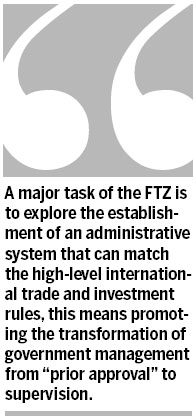Accumulation of experience
Updated: 2013-11-11 07:31
By Xu Hongcai (China Daily)
|
|||||||||||
Shanghai's FTZ will help the country cultivate advantages in global competition and drive domestic economic reform

In the context of the sluggish global economic recovery and China's ongoing economic restructuring, Shanghai's pilot free trade zone, which started operating on Sept 29, has an important historical mission.
The FTZ will help enhance Shanghai's international competitiveness in a comprehensive way and promote its construction as an important economic, financial, trade and shipping center. It will promote offshore business, offer tax advantages to financial transactions, including overseas investment revenue, and support Chinese companies going abroad for investment.
As the first special customs supervision zone that is consistent with international practice, the FTZ will further promote reform and opening-up, reduce costs in all aspects through greater investment facilitation and trade liberalization. In particular, it will help facilitate the transformation of the government's function, release institutional dividends, and create a model project, which can be promoted across the country. Meanwhile, through working in concert with the authorities of the Hong Kong Special Administrative Region, the FTZ will help comprehensively enhance the competitiveness of the mainland's financial industry in the international financial system.
Expanding opening-up in turn will drive domestic economic reform. After the 2008 international financial crisis, a variety of free trade arrangements were formed around the world, bringing both opportunities and challenges to China's foreign trade and investment. Meanwhile, after experiencing more than 30 years of rapid economic growth, China's comparative advantage in labor costs and other fields is vanishing, and considering the prospect of a potential economic slowdown, there is an urgent need for new growth engines. The Shanghai FTZ is a test bed for China so it can better participate in the international division of labor and participate in the rule-making process of international trade and investment. By combining opening-up, institutional reform, and policy innovation, the FTZ will help explore deeper reforms while ensuring the risks are controllable.
The FTZ will help explore new economic management models. The introduction of a negative list to the FTZ is a major measure to integrate with international norms in the context of the global economic governance restructuring. The negative list outlines the sectors off-limits to foreign investors within the FTZ and any sectors not on the list are open to foreign investors. In recent years, the negative list management approach has become the mainstream for international trade and investment management. This attempt to adapt to new changes in the international financial, investment, and trade fields can help improve management transparency and the efficiency of resources allocation.
Related Stories
FTZ will be new economic driver 2013-11-08 09:14
DB wins approval for branch in Shanghai FTZ 2013-11-07 14:59
Shanghai FTZ tribunal opens to boost trade 2013-11-06 07:06
SSE 'has no plan for intl board in FTZ' 2013-10-31 17:15
Guangdong, HK, Macao FTZ 'set for approval' 2013-10-31 15:48
Mistakes allowed in FTZ trials: think tank 2013-10-31 10:59
Today's Top News
China, India, Russia seek co-op on int'l issues
Man attacks 2 foreign students with hammer
Vaccine switch to prevent paralysis
Suspect arrested in 3 children's murder
SOE reforms to be launched after plenum
'Singles Day' to see big spenders
Launch zone challenges
European satellite continues fall to Earth
Hot Topics
Lunar probe , China growth forecasts, Emission rules get tougher, China seen through 'colored lens', International board,
Editor's Picks

|

|

|

|

|

|





